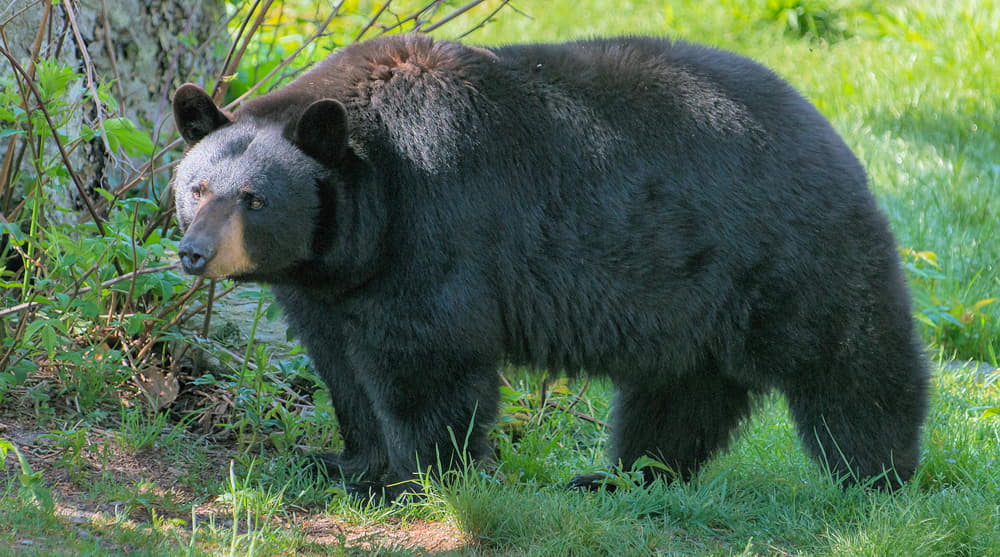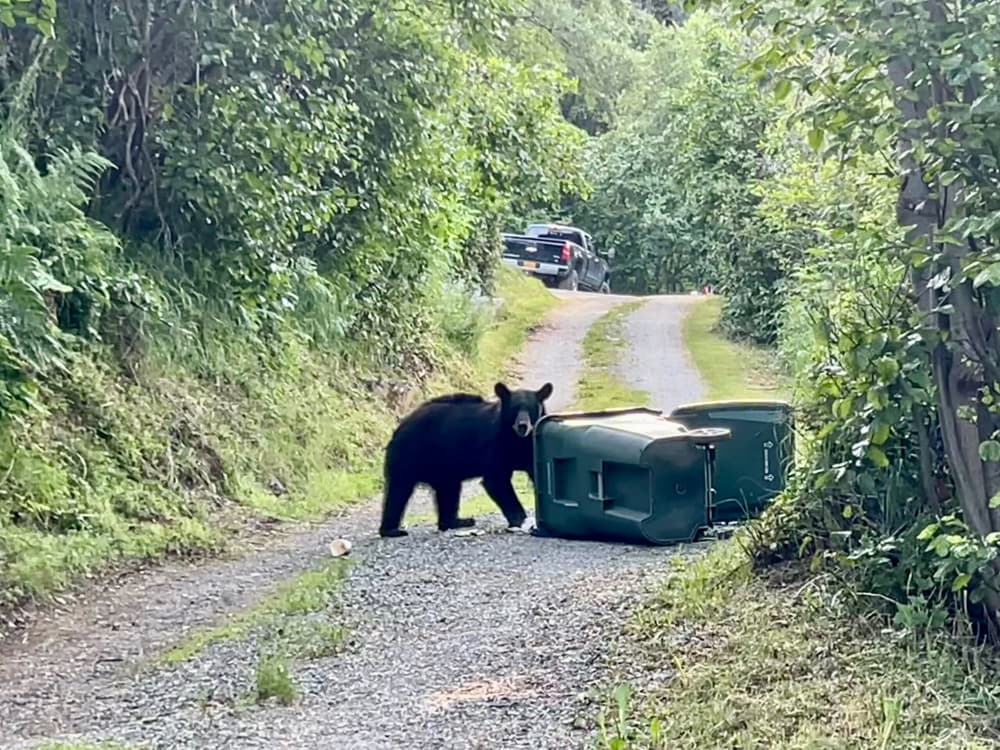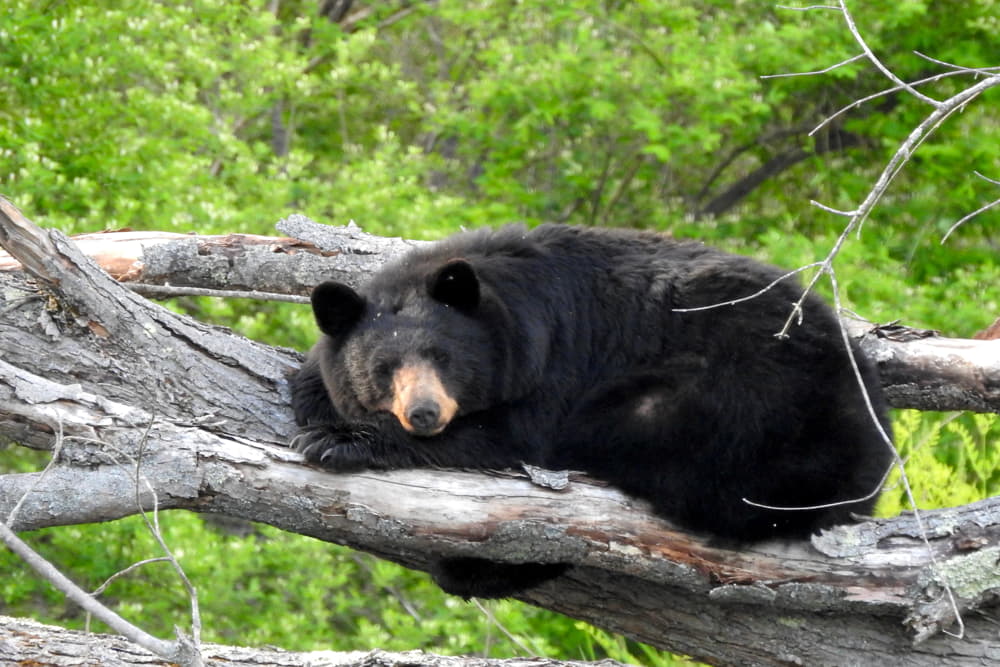Black bears are known for their exceptional sense of smell, which is said to be one of the best in the animal kingdom. The black bear’s sense of smell allows it to detect scents at great distances. But just how far can a black bear smell?
The olfactory system of a black bear is thought to be seven times stronger than that of scent-tracking hunting dogs. Humans rely heavily on sight and hearing, but for black bears, their sense of smell is the primary sense they use to navigate their environment. Their keen sense of smell aids them in detecting food sources, mating partners, and avoiding potential dangers.
This exploration will shed light on the astonishing distances over which these enigmatic creatures can discern scents. Let’s look at how they use their sense of smell, how far they can smell, and what this means for humans who encounter them. Thereby further improving our understanding of their special sensory world.
Table of Contents
About The Black Bear’s Sense Of Smell
Black bears are said to have one of the most acute senses of smell in the animal kingdom. This extraordinary sense of smell aids them in detecting danger, finding food, locating partners, and making sense of their surroundings.
Their sharp noses serve as powerful sensors, constantly sampling the air for data. Every waft of the wind brings new data, each more revealing than the last. Their sense of smell gives them a near-constant stream of crucial information, from the presence of a competitor to a hidden store of food or a human intruder.
Black bears interpret scents with seeming ease, turning the kaleidoscope of odors that flood their nostrils into useful, actionable information.
The Science Behind The Sniff
To perceive and interpret scents, black bears rely on a sophisticated network of olfactory receptors and cerebral connections. When a molecule of odor enters its nose, it connects to one of these receptors, causing an electrical signal to be delivered to the brain.
In the brain, this electrical signal is interpreted as a specific smell. Each scent has its own distinct characteristic, allowing the bear to differentiate between a wide range of scents. This system is incredibly sensitive, capable of detecting even the faintest odors.

However, a bear’s olfactory system is more than just sensitivity; it is also about interpretation. They can understand a wide range of odors, allowing them to gain crucial information from their surroundings. This ability to interpret scents, combined with their exceptional memory, makes them expert scent detectives.
Black bears have also evolved a number of habits that maximize their use of this great sense. They are frequently seen standing on their hind legs, sniffing the air. This stance lifts their nose, allowing them to pick up fragrance molecules carried by the breeze.
Comparison To Other Animals
Researchers estimate that a black bear’s sense of smell is seven times that of a bloodhound and hundreds of times that of a person. In terms of size, a bear’s interior nose membrane is four times larger than a dog’s. This makes them one of the most powerful scent detectors in the natural world.
Black bears also surpass white-tailed deer, a common prey species, in terms of olfactory perception. Even wolves, foxes, predatory birds and rodents are far behind black bears in terms of scent ability. The sheer amount of olfactory receptors in a black bear’s nose – about 100 times more than a person – contributes to its excellent sense of smell.
Smell And Seasonal Behavior
A black bear’s sense of smell influences its behavior throughout the year, especially during hibernation and mating season. As the seasons change, so too do the smells that fill its environment, triggering various behaviors.
When bears prepare for hibernation in the fall, the smell of ripe fruits and nuts drives foraging behavior. Their metabolic activities slow down during hibernation, but they can still wake up if disturbed. The fragrance of an intruder, for example, can awaken a bear from its winter slumber.
Smells are important during the mating season in the spring. Males can sense a receptive female’s pheromones from miles away and will follow the fragrance to find a mate. Females, too, can use their sense of smell to assess possible mates. Then, choose those whose aroma indicates good health and genetic compatibility.
How Far Can A Black Bear Smell?
Many sources claim black bears can smell odors from 18 to 20 miles away. Two miles is an average meal prep for a black bear to find dead wildlife or leftovers from human visitors. In practically any condition, these same black bears can pinpoint food within a mile.
Furthermore, black bears have tracked wildlife remains from three miles. This distance varies depending on 4 main factors, including wind direction, humidity, temperature and the strength of the odor itself. The warmer it gets, the stronger the scents become and the further they can travel. Humid weather conditions also make your scent travel further.

Even in less-than-ideal settings, a black bear’s sense of smell is extraordinarily strong and can detect aromas from over a mile away. These impressive scent-detection abilities make black bears master foragers. They can identify the ripest berries, carrion buried deep within the woodland, and even the tiniest hint of honey within a bee’s nest.
The strength of a black bear’s nose is derived from its complex and specialized structure. Their nostrils are much larger and more complicated than ours, with significantly more scent receptors. Their interior structure is a labyrinth of bony and soft tissue structures, which enhances the available surface area for scent sensing.
These anatomical traits enable them to detect a wide spectrum of odors, including many that other animals would undetectable. Their capacity to comprehend these aromas, to decipher the story each smell tells, distinguishes them as true olfactory experts.
Read this post: Are Black Bears Color Blind? How the Bear’s Eye Really Works
Tips For Minimizing Hunter Scent
Here are 8 tips to help you minimize your scent on bear hunting:
- Use Scent Control Clothing: Ensure use of scent control clothing and gear, such as scent-blocking clothing and scent-eliminating sprays. These products are designed to reduce human odors and can be very effective when used properly.
- Store Your Hunting Gear Properly: Ensure keep your hunting clothing and gear in a scent-free environment when not in use. Use airtight containers or scent-control bags to store your clothing and accessories.
- Shower with Scent-Free Soap: Ensure use scent-free soap and shampoo to shower before the hunt. Take care to clean your entire body, including your hair and underarms.
- Use Scent-Free Laundry Detergent: Ensure wash all your hunting clothing, including undergarments, in scent-free laundry detergent. Avoid using fabric softeners, which can leave a scent residue.
- Boots and Footwear: Ensure use rubber boots or scent-free boots and avoid walking through areas with strong scents, such as gasoline or strong-smelling plants. Walk through a mud puddle or stream before the hunt to remove ground smells from your footwear.
- Scent-Free Deodorant: Ensure apply scent-free deodorant before the hunt, and reapply as needed during the day.
- Hunt the Wind: Ensure pay close attention to the wind direction and hunt from a position where the wind is in your favor. Bears have a keen sense of smell, and hunting with the wind in your face can help prevent them from detecting your scent.
- Scent-Control Techniques: Ensure you consider using scent-control techniques like ozone generators or scent-dissipating wicks to help neutralize odors in your hunting area.
Minimizing hunter scent is critical for enhancing your odds of success and lowering your risks of scaring away or alerting bears to your presence. Remember that bears have a highly developed sense of smell, and no method is foolproof. However, by following these tips and being aware of your odor, you can boost your chances of approaching bears without alerting them.
Final Thoughts
In conclusion, a black bear’s sense of smell is truly remarkable. With the ability to detect odors from up to 20 miles away, black bears use their sense of smell to find food, mark their territory, and avoid danger. For hunters, it is important to be aware of the scent they bring into bear territory and improve their skills in approaching this sensitive prey.

